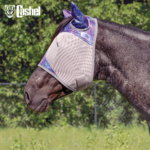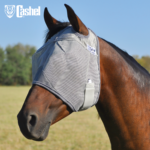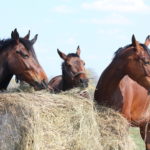Everyone makes mistakes in the show ring. Many times, people let those mistakes affect the rest of their show experience. But there are ways to overcome adversity and stay mentally tough in the show ring.

Michigan State University Equine Extension Specialist Karen Waite of East Lansing, Michigan, and trainer Brynne Bassler of Tomball, Texas, offer these tips for exhibitors:
1. Take one event at a time.
?I tell my people to take one event at a time,? Brynne says. ?Don?t worry about the trail at the end of the day until you get there.?
Although Brynne stresses to her clients the importance of knowing their patterns, many times she won?t allow them to study a pattern until it is almost time for that class.
After an exhibitor completes his class, no matter whether it was a good or bad go, Brynne encourages her clients to reflect on the class.
2 Change your thinking.
The fear of failure is perhaps the biggest obstacle for most competitors.
?We sometimes ride to avoid losing, as opposed to riding to win,? Karen says.
Karen recommends that riders focus on the individual elements of a pattern, or if it’s a rail class, to make each element in the class as correct as possible.
A must-have for anyone interested in hunt seat equitation success, AQHA?s ?Hunt Seat Equitation? DVD provides competitors with detailed descriptions of the proper show ring techniques.
3. Learn to relax.
?It takes practice to relax, especially in this day and age,? Karen says. ?Practicing deep breathing exercises and focusing on your breath can really help.?
Many times, exhibitors hold their breath and tense up while they are showing.
?If you focus on your breath while showing, that can sometimes be enough to distract you from everything going on in your mind, too. It’s like meditating. If you find your mind wandering to something else, just bring it back to your breath and your horse and go from there.?
If you are feeling pressure or stress, Karen recommends taking a 15-minute window before the class and another 15 minutes after the class just for yourself.
4. Practice positive visualization.
Visualization can help an exhibitor immensely, but to do it well, you need to know how to relax, Karen says.
?Clear your mind of everything else and imagine yourself doing patterns absolutely perfectly,? she says. ?When you’re imagining something, whether it is good or bad, your brain doesn’t really know any differently. If your horse has a tendency to make a mistake at a particular spot in a pattern, don’t focus on that. Instead, imagine your horse doing it perfectly.?
5. Get rid of the negative.
If things go wrong, remember there’s always another horse show.
?If you make a mistake in your pattern or have a bad go, don’t come out of the arena so torn up about it that it ruins your whole day,? Brynne says.
Instead, go to someone supportive, like your trainer or a friend, to talk about what you did wrong.
Then relax for a few minutes to think about the run and what you’re going to do to make it better next time.
?Then forget about it,? Brynne says.
6. Reflect at the end of the day.
At the end of the show day, Brynne encourages her amateurs and youth to reflect on what they have done.
She says it is often helpful to write down both the positive and negative aspects of the day, kind of like a journal.
Another thing Brynne likes to do is write down the judge for the day and what they seemed to prefer in a class.
Get the inside information straight from AQHA judge Don Burt in AQHA?s ?Hunt Seat Equitation?. Don tells you what riders can do to catch his eye in the show ring.
7. Be prepared mentally.
?I think a lot of people get so anxious to do the best they can, they overdo it,? Brynne says. ?My firm belief is to do your homework at home before you go to the horse show. If you?ve done that, then trust yourself when you get to the show. Don?t get there and panic.?
8. Take care of yourself.
Showing horses is supposed to be fun, and many times competitors forget that.
It’s OK to be competitive, but at the end of the day, smile and say hello to your fellow exhibitors.
And remember to take care of your physical needs.
?Get plenty of rest. Get plenty of water. Eat right. Maybe get away from the show grounds if it’s an extended show and go do something else,? Karen says.
Taking care of yourself also means surrounding yourself with supportive, positive people.
9. Don?t push it.
?If you’re tired and cranky, it’s not going to work,? Brynne says.
Don?t start your day out on a bad note.
?If you wake up and you’re in a bad mood, go eat breakfast. Do something that will take your mind off the negative parts of the day,? she says.
Make sure you take plenty of time to get ready to show, getting dressed, doing your hair and taking care of your horse.
?You don’t want to be in a rush,? Brynne says.
10. Don?t forget your horse.
?Sometimes all of these stresses of showing wind up getting taken out on the horse,? Karen says.
If your horse is having a bad day, Brynne recommends letting the horse have some time to relax.
?He doesn’t need to go through the pattern 12 times just because you’re nervous about it,? she says. ?Make sure you have plenty of time to practice, but don’t over do it. If he’s being really good, go put him away, don’t keep schooling him.?
Also, if you know your horse gets tired after three days of a big show, and he’s not going to be in a good mood or ready for his class, you might consider taking the day off.





